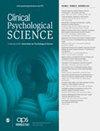测试有无暴食女性的负紧迫性奖赏加工模型
IF 4.1
2区 医学
Q1 PSYCHIATRY
引用次数: 0
摘要
消极急迫感(即在经历消极情绪时冲动行事的倾向)与精神病理学密切相关,但消极急迫感的内在机制及其与心理健康的关系却不甚明了。除了干扰认知控制外,负面情绪还可能通过增强对期望刺激的奖赏处理而导致冲动行为。在这项研究中,我们对 153 名女性进行了测试,她们的暴饮暴食严重程度各不相同,因此我们采用了一种情绪增强奖赏加工模型来研究负性紧迫感。参与者在紧张和放松的情绪条件下完成了两项实验任务,同时对美味食物奖赏加工的生理、行为和自我报告指数进行了评估。与假设相反,无论是在全部样本中,还是在负面紧迫感更强或暴食频率/严重程度更高的参与者中,压力与放松时对食物的奖赏处理都没有增强。考虑到研究的局限性和之前关于负面紧迫感的机理研究,本文对研究结果进行了讨论。本文章由计算机程序翻译,如有差异,请以英文原文为准。
Testing a Reward-Processing Model of Negative Urgency in Women With and Without Binge Eating
Negative urgency (i.e., the tendency to act impulsively when experiencing negative affect) is robustly associated with psychopathology, but the mechanisms underlying negative urgency and its relation to mental health are not well understood. In addition to interfering with cognitive control, negative emotions may lead to impulsive behavior by enhancing reward processing of desired stimuli. In this study, we tested an emotion-enhanced reward-processing model of negative urgency in 153 women who spanned the spectrum of binge-eating severity. Participants completed two experimental tasks under both stressful- and relaxed-mood conditions while physiological, behavioral, and self-report indices of reward processing of palatable food were assessed. Contrary to hypotheses, reward processing of food was not heightened when stressed versus relaxed either in the full sample or in participants with greater negative urgency or binge-eating frequency/severity. Findings are discussed considering study limitations and previous mechanistic work on negative urgency.
求助全文
通过发布文献求助,成功后即可免费获取论文全文。
去求助
来源期刊

Clinical Psychological Science
Psychology-Clinical Psychology
CiteScore
9.70
自引率
2.10%
发文量
35
期刊介绍:
The Association for Psychological Science’s journal, Clinical Psychological Science, emerges from this confluence to provide readers with the best, most innovative research in clinical psychological science, giving researchers of all stripes a home for their work and a place in which to communicate with a broad audience of both clinical and other scientists.
 求助内容:
求助内容: 应助结果提醒方式:
应助结果提醒方式:


